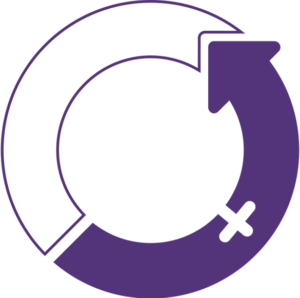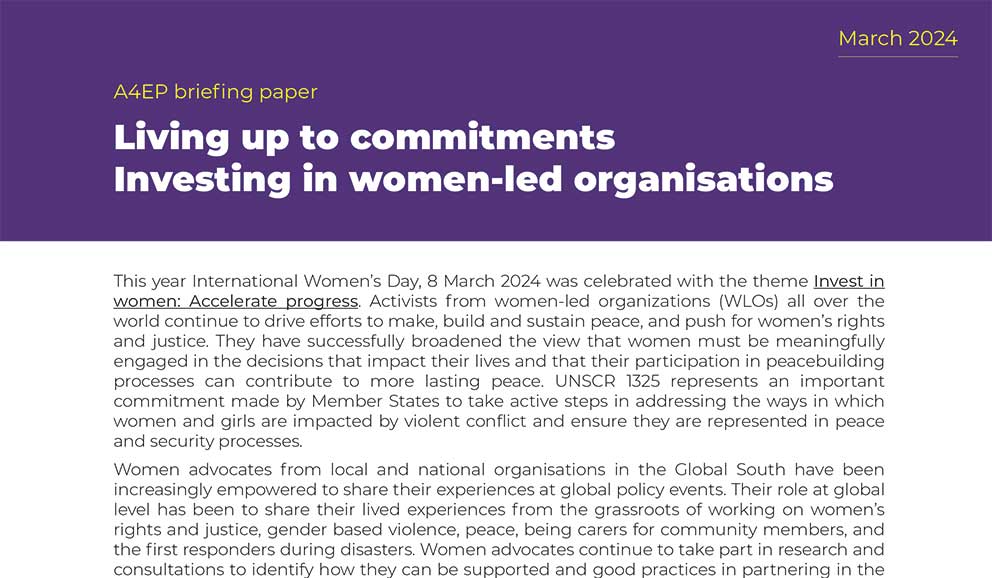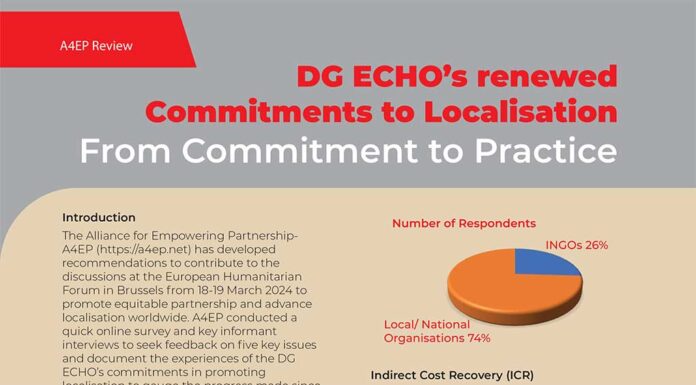This year International Women’s Day, 8 March 2024 was celebrated with the theme Invest in women: Accelerate progress. Activists from women-led organizations (WLOs) all over the
world continue to drive efforts to make, build and sustain peace, and push for women’s rights and justice. They have successfully broadened the view that women must be meaningfully engaged in the decisions that impact their lives and that their participation in peacebuilding processes can contribute to more lasting peace. UNSCR 1325 represents an important commitment made by Member States to take active steps in addressing the ways in which women and girls are impacted by violent conflict and ensure they are represented in peace and security processes.
Women advocates from local and national organisations in the Global South have been increasingly empowered to share their experiences at global policy events. Their role at global level has been to share their lived experiences from the grassroots of working on women’s rights and justice, gender based violence, peace, being carers for community members, and the first responders during disasters. Women advocates continue to take part in research and consultations to identify how they can be supported and good practices in partnering in the hope that they can contribute to systems change. In turn, women-led organisations in the Global South have also gained knowledge about international commitments to equitable partnership. It has been a repeated theme in many international seminars, and notable in policy discussions and some policy documents.
Women advocates invest their time voluntarily in the hope that they can bring change at grassroots and global level. However, despite many years of advocacy and several international commitments affirming the importance of partnering with WLOs and a growing body of good practices on how to do so—WLOs remain largely under-resourced and overlooked. Not only that, but the women who are advocating for change at global level are also facing backlash at country level.
Cost of speaking up
International organisations have been empowering women leaders by facilitating their participation in global spaces and making them aware of the commitments so they can hold stakeholders accountable, so it is ironic that now that they are speaking up it comes with backlash and targeting. Women leaders who push back and ask for mutual respect are seen as a risk, because they are knowledgeable, and knowledge is power. Some are seen as a threat because they call out the structural inequality and demand more equitable partnerships and accountability. International actors would rather work with other women’s organisations who do not challenge them, either because they are not aware or because they choose to keep quiet. Yet ironically, international actors claim to work on women rights, equity and justice.
 Women activists are now having to choose between speaking out and losing their operational relevance at country level, or maintaining funding opportunities. WLOs notice that international actors would rather work with those that are not well informed or are not vocal. Their experience is that as they end their current partnerships, new ones are not forthcoming. It is difficult to establish new partnerships because they are seen as well informed, and as a ‘challenge’. They notice that international actors move on to organisations that comply without asking questions.
Women activists are now having to choose between speaking out and losing their operational relevance at country level, or maintaining funding opportunities. WLOs notice that international actors would rather work with those that are not well informed or are not vocal. Their experience is that as they end their current partnerships, new ones are not forthcoming. It is difficult to establish new partnerships because they are seen as well informed, and as a ‘challenge’. They notice that international actors move on to organisations that comply without asking questions.
Women activists are seen as information sources: they bring information from grassroots to global levels to inform the decisions. But at the same time, they take all the risks, and receive backlash and targeting. This has a significant impact on the women-led organisations – it puts resourcing for their activities with the community at risk thus impacting organisational survival, creates stress and impacts their mental health. Over time, these impacts are going to further reduce the number of women activists who
Living up to commitments Investing in women-led organisations will be willing to speak out for change. It is a very high price to pay and has harsh consequences for the community.
 Investing in women leaders is not just about paying for women leaders to attend meetings, it is also about resourcing the work they do. There is advocacy for women leaders to take on coordination roles at global or national level but there is no resource support for them, whereas international organisations have policy staff who are fully paid. Somehow local women leaders are expected to do things on voluntary basis. Their time in not compensated and their work at country level suffers. We need to recognise more the efforts of their work by supporting them with resources but also ensuring that they are not targeted because of their voice.
Investing in women leaders is not just about paying for women leaders to attend meetings, it is also about resourcing the work they do. There is advocacy for women leaders to take on coordination roles at global or national level but there is no resource support for them, whereas international organisations have policy staff who are fully paid. Somehow local women leaders are expected to do things on voluntary basis. Their time in not compensated and their work at country level suffers. We need to recognise more the efforts of their work by supporting them with resources but also ensuring that they are not targeted because of their voice.
Women activists collaborate with INGOs and UN agencies to engage with donors at global level to advocate for funding for women led organisation, however when funding arrives women leaders do not even know about it or its is being used for supporting other partners who are less vocal. When other women leaders see how global women advocates are treated, they do not want to take that space.
Investing in women advocates- recommendations for way forward
Governments and donors
- Enable the civic space, protection, and provide measures to ensure participation and inclusivity of all women regardless of their ethnic and race backgrounds.
- The donors who have feminist foreign policy need to do more to ensure support for
women led organisations. - Support women advocates through the embassies in country as it is less bureaucratic and faster.
- Support women leaders in global advocacy spaces so they can demonstrate the good
practices and success and identify bottlenecks and challenges and how to improve. - Provide a safe space for direct dialogue with women advocates and resources for their
policy and advocacy work.
International INGOs and UN
- The international organisations who support the women advocates to attend the global
meetings should support them with partnerships at country level. - More transparency and accountability for the funds that are being raised in the name of
WLOs. Questions should not only be expected but welcomed. - Ensure fairer share of funds to local women advocates.
- Recognising women advocates time investment by resourcing their policy and advocacy
work.
Local and National women leaders
- Get yourself informed about the international commitments to support women-led
organisations and develop critical perspectives. - Work with your international partners to implement the commitments and hold them to
account. - Believe in your own capacity, and provide support and solidarity to global women
advocates. - Write about your experiences and share widely.
- Establish cross regional support groups for solidarity and protection if required.
Local and National Male leaders
- Listen more deeply to the challenges facing women leaders and support them.
- Step aside and stand side by side for women advocates to take their space.
- Show solidarity by collaborating with them instead of competing with them.
- Celebrate their success instead of targeting them.
Download the PDF copy [English version] [Arabic version]



